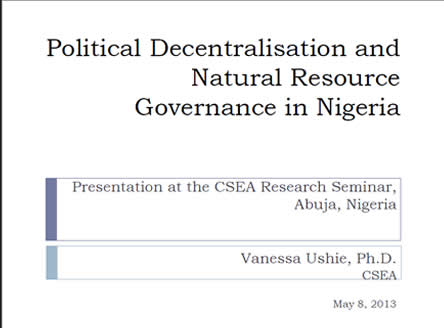Background
- Nigeria is a federal country with a tripartite administrative structure national govt. + 36 states + 774 local governments, each of which has constitutionally defined functions
- Since 1999, political decentralisation has given subnational governments greater autonomy over their fiscal affairs
- Low public accountability very little is known about how subnational governments are using their oil revenues.
- In the resource-rich Niger Delta, this contradiction between power and unaccountability is most extreme
- Oil producing states receive 13% monthly oil revenue derivation payments for territorial oil production, in addition to constitutionally entitled revenues
- This has quadrupled the size of state budgets and expenditures
Problem:
- Academic and policy scholarship tends to focus more on centralised than decentralised political corruption in Nigeria
- Poverty and corruption cannot be addressed without improved sub-national accountability in the use of natural resource revenues

